The priesthood plays a central role in the whole of the Torah. The middle section of the Torah, from Exodus 25 all the way through to Numbers 10, focuses almost solely on the function of the Tabernacle, the priesthood, and the ordinances to be followed by the people. The priesthood would continue to dominate in the spiritual life of the people of Israel from the wilderness of Sinai all the way up to the destruction of the Temple in 70 AD. As we study this week’s Torah Portion we will investigate the priesthood and discover the signs of the priesthood pointing to the Messiah.
Watch a short video overview of this week’s Torah Portion commentary!
The Commencement of the Priesthood
Moses is still on Mount Sinai during his 40 day experience with God as we read this week’s Torah Portion. In last week’s study (Giving God’s way) the LORD explained to Moses the design and dimensions of the Tabernacle and in this week’s study the LORD focuses on those who will minister in the Tabernacle:
Then bring near to yourself Aaron your brother, and his sons with him, from among the sons of Israel, to minister as priest to Me—Aaron, Nadab and Abihu, Eleazar and Ithamar, Aaron’s sons. – Exodus 28:1
The priesthood of the Tabernacle was announced for the first time in this verse by God Himself. Aaron and his sons were commissioned to minister as priests to the LORD, although, since Moses is still on the mountain, only he is hearing the appointment of the priesthood at this time.
The LORD also explained to Moses the responsibilities of the priesthood. The priests were responsible for the ceremonial function of the Tabernacle, which later carried over into the Temple service. We read of four distinct tasks, which are described in this week’s study, which the priests were to perform in the Tabernacle:
-
Twice daily they were to light the lamps of the menorah (Ex. 27:20-21)
-
Twice daily they were to sacrifice a one year old lamb (Ex. 29:38-46)
-
Twice daily they were to burn incense on the altar of incense (Ex. 30:1-9)
-
Once per year they were to make atonement upon the altar of incense on the Day of Atonement by applying blood to the horns of the altar (Ex. 30:10)
It was Aaron and his sons who were to perform these tasks and no one else. It was a service to the LORD that was limited through the family line of Aaron.
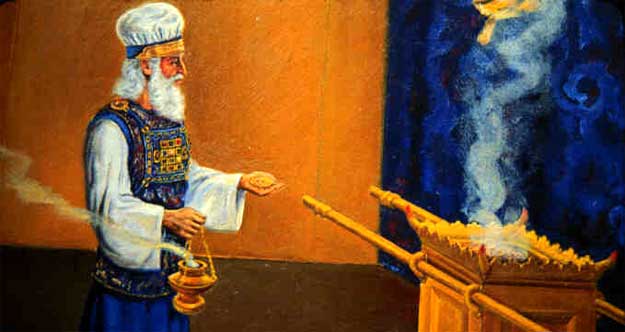
Qualifying for the Priesthood
The office of the priesthood was occupied solely on the basis of being a descendant of Aaron. Being a priest was almost like being born into the royal family. We also learn in the book of Numbers that the priesthood was both a privilege and a burden to bear:
So the LORD said to Aaron, “You and your sons and your father’s household with you shall bear the guilt in connection with the sanctuary, and you and your sons with you shall bear the guilt in connection with your priesthood. – Num. 18:1
The LORD had made the priesthood an exclusive division of service to Him through the household of Aaron. Aaron and his sons were also to bear the sins of the people through the sacrifices of atonement which they were to continually offer up:
So you shall attend to the obligations of the sanctuary and the obligations of the altar, so that there will no longer be wrath on the sons of Israel. – Num. 18:5
The priests served as intermediaries between God and the Israelites. The guilt and wrath which would naturally fall upon the Israelites because of their sin was taken away through the sacrifices on the altar which were performed by the priests.
The Exclusivity of the Priesthood
The priesthood was more than an occupation and more than just an important responsibility. The priests were to maintain the spiritual connection of the people as a whole with the living God. The significance of the priesthood was further clarified through the punishment of anyone who entered into this office illegitimately:
But you and your sons with you shall attend to your priesthood for everything concerning the altar and inside the veil, and you are to perform service. I am giving you the priesthood as a bestowed service, but the outsider who comes near shall be put to death. – Num. 18:7
It was only the male line of Aaron who would qualify for the service of the priesthood. Anyone who tried to enter into the service of the priesthood who was not of the lineage of Aaron was to be put to death. The priesthood was literally an office of life and death.
The priesthood was a family business that continued for generations, about 1500 years, from the time of Moses and Aaron until the destruction of the Second Temple in 70 AD. The daily and annual activities of the priesthood were enough to keep Aaron and his sons occupied on a full-time schedule, however, as the generations continued the priests would soon outnumber their assigned tasks, meaning that there would be more men than daily work to accomplish. This was an issue that King David sought to resolve before handing over the kingdom to his son Solomon.
The Division of the Priesthood
King David was the anointed man of God to rule over the Israelites at the height and the glory of the kingdom of Israel. King David then passed on his powers to his son Solomon when King David was advanced in years (1 Chronicles 23:1). King David had it in his heart to build the Temple of the LORD in Jerusalem, however, the LORD would not allow him to build the Temple, instead, the LORD told him that his son would build the Temple (1 Chronicles 17:1-15).
King David did everything within his power and ability to prepare the way for his son Solomon to build the Temple of the LORD, including preparing the materials for building the Temple (1 Chronicles 22). In his foresight, King David also organized all of the priests and Levites in regard to the Temple service (1 Chronicles 23). The Levites were set apart from the sons of Israel to assist the priests, however, it was only the priests who were permitted to minister before the LORD:
The sons of Amram were Aaron and Moses. And Aaron was set apart to sanctify him as most holy, he and his sons forever, to burn incense before the LORD, to minister to Him and to bless in His name forever. – 1 Chronicles 23:13
The descendants of Aaron were chosen to carry on the priesthood which included burning incense before the LORD and ministering before Him. Although the priests and the Levites worked together they had separate functions and specific jobs to carry out.
All of the descendants of Aaron were succeeded by Aaron’s younger two sons Eleazar and Ithamar. Aaron’s first two sons, Nadab and Abihu, died when they offered strange fire before the LORD (1 Chronicles 24:1-2). King David along with Zadok, a descendant of Eleazar, and Ahimelech, a descendant of Ithamar, divided all of the priests into a total of twenty-four divisions to perform their service at the proper time (1 Chronicles 24:1-19).
The Twenty-Four Divisions
It is written in the Talmud that the twenty-four priestly divisions each served with their family for one week at a time. Each Sabbath day, the shift would change from one division to another (The Babylonian Talmud. Seder Mo’ed. Vol. 3. Yoma 22a). During the three mandatory biblical festivals, all of the male Jews were commanded to be in Jerusalem (Deut. 16:16). The priests, therefore, would all be gathered together at the Temple during the feasts as well. In this way, the priestly service would continually be performed at the Temple whether through the weekly service of the twenty-four divisions or during the three biblical feasts.
When the priests assembled at the Temple for their periodic service, there were different tasks to be performed. It is traditionally believed that specific families would be responsible for a specific day of the week and than individual responsibilities were assigned by means of a lottery system (ibid. Yoma 2b). To learn more about the drawing of lots for the priestly responsibilities, I recommend the following link from the Temple Institute: The Priestly Lottery System
Zechariah the Priest
We see an example of the lottery system used for delegating the responsibilities of the priesthood in the New Testament. The following account is recorded in the Gospel of Luke:
In the days of Herod, king of Judea, there was a priest named Zacharias, of the division of Abijah; and he had a wife from the daughters of Aaron, and her name was Elizabeth. They were both righteous in the sight of God, walking blamelessly in all the commandments and requirements of the Lord. But they had no child, because Elizabeth was barren, and they were both advanced in years.
Now it happened that while he was performing his priestly service before God in the appointed order of his division, according to the custom of the priestly office, he was chosen by lot to enter the temple of the Lord and burn incense. – Luke 1:5-9
It was during the reign of Herod, who was the Roman king of Judea. The story begins with a Jewish priest who was from the division of Abijah, one of the twenty-four divisions mentioned in 1 Chronicles 24. Zacharias is some form of the original Hebrew name, Zechariah. His name was Zechariah and I will use this form of his name from here on.
Zechariah was a priest, meaning that he was a descendant of Aaron, and he married Elizabeth who was also a descendant of Aaron. It is interesting to note that Aaron’s wife was also named Elizabeth (Ex. 6:23). The name “Elizabeth” is taken from the Hebrew “אלישבע” – “eli-sheva,” which means “the oath of my God.” The name “Zechariah” is also a Hebrew name, “זכריה” – “zachar’Yah,” which means “The LORD remembers.” Between the two of them they had a powerful testimony in their names. The irony of their names was that it seemed like God had forgotten them: Elizabeth was said to be barren, they were childless, and, from what we gather from the text, they were no longer in the “baby bearing years” (Luke 1:7).
The lot is cast into the lap,
But its every decision is from the LORD.
Proverbs 16:33
The Chosen Priest
It was at this time in Zechariah’s life, when he seemed to be forgotten by God, that Zechariah was chosen by lot to go into the Temple and burn incense on the altar of incense (Luke 1:8-9). It seems like such a menial and simple task, however, it was one of the daily responsibilities that God commanded to be carried out twice a day in the Temple. It was also a desired responsibility by the priests which held special significance.
The burning of incense on the altar of incense was held as the most honored blessing in the Temple service and was only granted once in a priest’s lifetime (The Temple Institute, Burning of Incense). It was literally a once in a lifetime opportunity and Zechariah was the chosen one for that particular year.
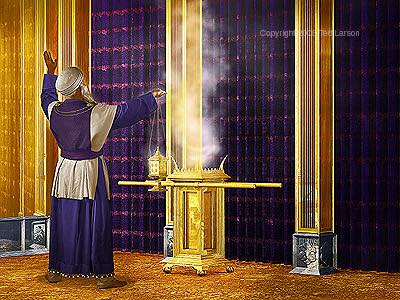
As we continue to read in the Gospel of Luke, it was no coincidence that Zechariah was chosen to enter into the Temple and burn incense before the LORD at that time:
And the whole multitude of the people were in prayer outside at the hour of the incense offering. And an angel of the Lord appeared to him, standing to the right of the altar of incense. Zechariah was troubled when he saw the angel, and fear gripped him. But the angel said to him, “Do not be afraid, Zechariah, for your petition has been heard, and your wife Elizabeth will bear you a son, and you will give him the name John. – Luke 1:10-13
God had sent the angel Gabriel (Luke 1:19) to give a message to Zechariah informing him that his prayers had been answered. Zechariah and his wife were naturally praying for children, for a child, and God had remembered them.
God had remembered Zechariah and his prayers for a child. More than this, God had remembered His people and through the son that Zechariah and Elizabeth would bear together, God would prepare the way for the coming of the Messiah:
It is he who will go as a forerunner before Him in the spirit and power of Elijah, TO TURN THE HEARTS OF THE FATHER BACK TO THE CHILDREN, and the disobedient to the attitude of the righteous, so as to make ready a people prepared for the Lord. – Luke 1:17
John was to be the forerunner to the Messiah in fulfillment of the prophecies spoken about him (Malachi 4:5-6).
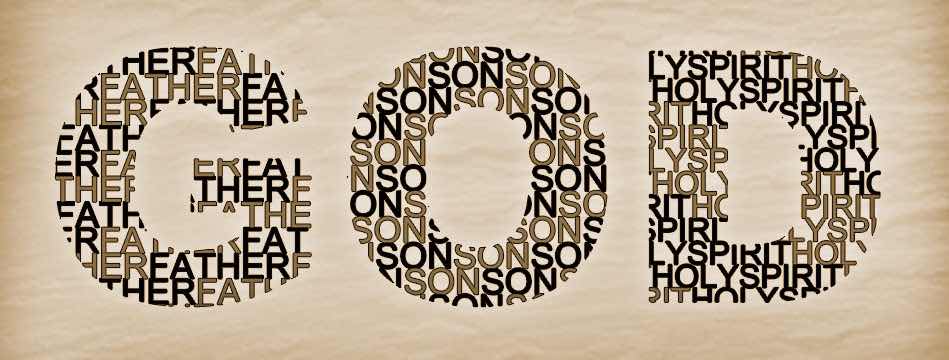
The Fulfillment of the Oath
The child that Zechariah and Elizabeth would bear was to be no ordinary child. He was to be filled with the Holy Spirit from the time that he was in his mother’s womb (Luke 1:15) and he had a special calling on his life. God had not only remembered Zechariah and Elizabeth but God had remembered the covenant with Abraham, salvation for the nation of Israel, and salvation for the world.
After the birth of John, Zechariah spoke a prophetic word as he was filled with the Holy Spirit. The prophecy which Zechariah spoke begins with these words:
Blessed be the Lord God of Israel,
For He has visited us and accomplished redemption for His people,
And has raised up a horn of salvation for us
In the house of David His servant—
As He spoke by the mouth of His holy prophets from of old—
Salvation from our enemies,
And from the hand of all who hate us;
To show mercy toward our fathers,
And to remember His holy covenant,
The oath which He swore to Abraham our father, – Luke 1:68-73
In remembering Zechariah and Elizabeth, the LORD God also remembered His covenant and His oath which He gave to Abraham. Their was a total fulfillment of the names of Zechariah and Elizabeth through the births of John and Yeshua. God had remembered (Zachar’Yah) His people and God had fulfilled His oath (Eli’Sheva). God is faithful and His timing is perfect.
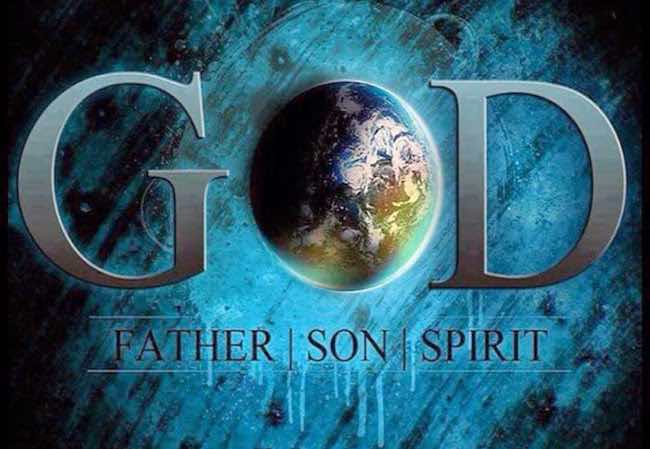
The Sign of the Priesthood
We see clearly how God wove together the details of the priesthood into the lives Zechariah and Elizabeth to fulfill His plan. The Providence of God is so beautifully crafted in His Word. There is one more sign that I want to point out as we look in more detail at the twenty-four divisions of the priesthood.
We read in the Gospel of Luke that Zechariah was from the priestly division of Abijah (Luke 1:5). In reading the list of the twenty-four divisions in the Old Testament we see the following three divisions in sequence:
the eighth for Abijah,
the ninth for Jeshua,
the tenth for Shecaniah, – 1 Chronicles 24:10-11
We begin with the eighth division, “Abijah,” which was the division of Zechariah followed by the next two divisions. When we examine these three names in the original Hebrew with the English translation of the names, we read the following:
-
Abijah – “אביה” – “avi’Yah” – The LORD is my Father
-
Jeshua – “ישוע” – “Yeshua” – Salvation
-
Shecaniah – “שכניהו” – “shechan’Yahu” – The dwelling of the LORD or The LORD dwells
It doesn’t take too much imagination to see a clear sign of God to His people through the priesthood. Zechariah could have been from any division but the LORD in His Providence placed him into the division of “Avi’Yah” followed by “Yeshua,” and “Shechan’Yahu.” Father God, Yeshua the Son, and the Indwelling presence of God through His Holy Spirit are all clearly prophesied through the priesthood.

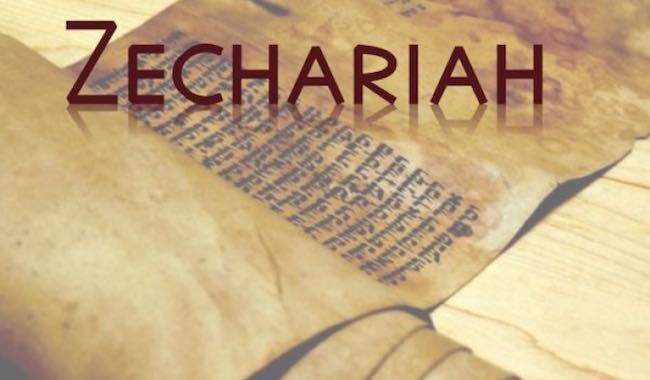
You bring wonderful insight into the scriptures thank you. Why are we given such detail about the genealogy of Zechariah and Elizabeth connecting them to Aaron? Is it to identify John as the official high priest at a time as the second temple period had a corrupt priesthood appointed by Rome and not based on genealogy ?
Is it also true that the high priest would select the lamb to be offered at Passover and therefore makes John’s declaration over Jesus at His baptism so powerful to his followers and “official”? The God of details!
Barbara, thank you for your comments.
To your question regarding the genealogy of Zechariah and Elizabeth, I’d refer you to my other article on the priesthood, The Sign of the Priesthood: http://www.jewelsofjudaism.com/the-sign-of-the-priesthood-tetzaveh/
There were always numerous lambs at Passover as each family needed to choose and eat the lamb every year. I hope this helps.
Daniel
Dear Daniel,
Whenever I read Scripture that cite minute details, like the construction and furnishing of the Temple, I am immediately inclined to try to find a broad theme, such as, sanctification–of the Jewish people, the Aaronic priesthood, and the Tabernacle and its furnishings.
I thank you for digging much deeper into this week’s Torah portion and illuminating in it reference to each person of our one God–Father, Son and Holy Spirit. As I have previously commented, The Shema, Deuteronmy 6:4, declares that the Lord is one Echad, that is a composite unity, as in, God in Three Persons, blessed Trinity. Truly this is yet another Jewel of Judaism!
May the Lord continue to use you mightily to llumiate His Word for all, Jew and Gentile alike!
By His Grace and for His glory,
Sal:-)
Thank you Sal!
I don’t fully understand what you are trying to pull from Deut. 6:4 from the Hebrew word “echad.” There is no three in one coming from this text.
God bless you!
Daniel
Thank you for this week’s teaching as I have been asking God to remember a very specific prophetic over my life. This week’s word spoke to me and I receive this teaching as an assurance of “eli-sheva,” “the oath of my God” and “zachar’Yah,” “The LORD remembers.”. It has brought comfort in the midst of testing. Shalom – Cindy from India.
You’re welcome Cindy!
God bless you.
Daniel
The Trinity is not in the 1st century church. This teaching only came at 325. For being Jewish, these are some great thoughts, but I can’t totally receive them. The Torah teaching is our road map, and it shows us how Hashem wants us to watch and listen. Never stop teshuva (repentance), and your Torah studies.
Thank you for your comments, however again, I think that you are missing the main point. In this week’s teaching I’m only showing what the Taanach (the Jewish Scriptures) already reveal. I never mentioned the word trinity in my teaching. You are finding this yourself. But if the concept of the trinity is being revealed why are you fighting against it?
Daniel
Just as we may be daughter, mother and wife we are the same person with distinct personalities and character…even so..God is One with three distinct personalities and operations. Thank you enjoyed your sermon….blessings
Nice explination
Dear Daniel Goldstein,
thank you for this wonderful Sermon.
But I do have a question: Why is the Holy Spirit always pointed out as the third “Person”?
G`D is ONE, HIS Spirit is in HIM – as our Spirit is in us. G`D´s words became flesh = His ideas became flesh = the Messiah JESHUA. He was braught to life by the Holy Spirit, because G`Ds Spirit is a life-creating Spirit.
I do not see the Holy Spirit as the third part of G`D; please, teach me better.
Thank you! and
SHABBAT SHALOM!
Dear Olive,
Thank you for your comments. Your question is one that deserves to be continually asked because we cannot understand God fully until we see Him face to face. “Trinitarian theology” generally tries to divide and explain the essence of God into three separate persons. This is a mysterious aspect of God that we must accept as truth according to the Scriptures and never try to limit God to our finite minds. At the same time, we must have a basis of our belief system as well. In Judaism, there is an understanding of God as the Father and an acceptance of the Holy Spirit of God but a denial of the Son of God.
What I have attempted to bring forth in this week’s teaching is the clear revelation of God as Father, Son, and Holy Spirit in the Script of the Jewish Scriptures. You are right in stating that God is One (Deut. 6:4) Yeshua Himself stated this (Mark 12:29). Our challenge is to understand how Yeshua and the Father are One (John 10:30) and how the Holy Spirit relates with both the Father and Son (John 14:16-26). Our challenge is to hold on to this truth and embrace the mystery.
Shabbat Shalom,
Daniel